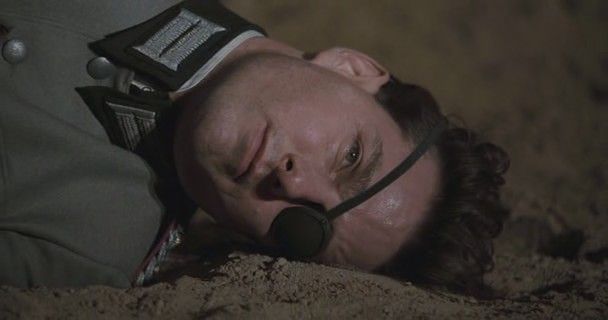
And then they discovered his head made great eraser material
Do not be mistaken: a movie may be based on real people and true events, but it ultimately stands as a piece of narrative where out of a universe of possible facts, only a few are selected and framed to achieve a dramatic or emotional effect in its audience.
Even Bryan Singer's mostly straightforward and by the facts accounting of Operation Valkyrie is not exempt from the artifice of storytelling. The dramatic turning point of Valkyrie occurs near the end, when Colonel Claus von Stauffenberg's martial coup falls apart as the voice of the Fuhrer on the radio rings through the conspirators' makeshift headquarters. The director's treatment of this scene provides a lesson on the deliberate choices that a director takes and those he consciously moves away from, and simultaneously illustrates the movie's strengths and weaknesses.
Told as a political thriller, the scene caps off half an hour of ominous dread of Things Going Wrong, beginning with botched instructions, hesitating coup conspirators, and a German Resistance leadership determined to snatch defeat from the jaws of victory. From here on, the failures begin their cascade, culminating with the tragic end of one Col. Claus and the mass execution of the German Resistance.
Yet it's not too hard to picture this scene as an emotional turning point. With just a whisper on the wireless, the Fuhrer puts an end to the coup; his voice sweeping away all compunctions on the part of undecided military commanders to cooperate with Claus's plan, and the previously unshakeable loyalty of most of Claus's rank and file conspirators to his cause. And instead of pointing towards a thriller, the scene suggests rather a character study on loyalty and charisma, and questions that the director elided:
How did Colonel von Stauffenberg manage to break Hitler's charismatic hold on the loyalty of the German army?
How did Colonel von Stauffenberg manage to command, up to that point, an equally mesmeric hold on the loyalty of his co-conspirators?
Why was Colonel von Stauffenberg made the commander of the coup, despite coming to the conspiracy late?
Bryan Singer's political thriller has the Colonel as a German version of an all-American blue-eyed boy. Perhaps it is understandable that given the casting of Tom Cruise, it would have been box-office suicide for Singer to focus on the colonel as a German poet, war hero, and moral philosopher whose aristocratic pedigree, bearing, and moral conviction made him a larger-than-life opponent whose charisma did match Hitler's.
Eschewing the moral and idealistic dimensions of tyrannicide completely, Singer and his scriptwriters concentrate on the story as pure thriller, avoiding the ire of audiences who rarely take kindly to "overacting", especially from actors of Cruise's calibre. Though pacing is generally taut and the tale succinctly told, I am not convinced the tradeoff was worth it - given that the ending was never in doubt (hint: they FAIL).
The second, and greater strength of Valkyrie lies with the quality ensemble acting by its cast, culled almost entirely from the British stage. Far outshining the pared down, almost bland performance of the lead, the veterans offer subtly drawn portraitures of the historical players involved, far beyond what the script provides.
Compared to efforts like Sophie Scholl: The Final Days, Bryan Singer's Valkyrie is a much more mainstream, streamlined, and perhaps too conventional product that takes next to no risks in its treatment of the various attempts by ordinary Germans to protest against Hitler. The movie, though, has no glaring missteps to recommend against it.
An earlier version of this review was first published at incinemas on 19 February 2009

No comments:
Post a Comment